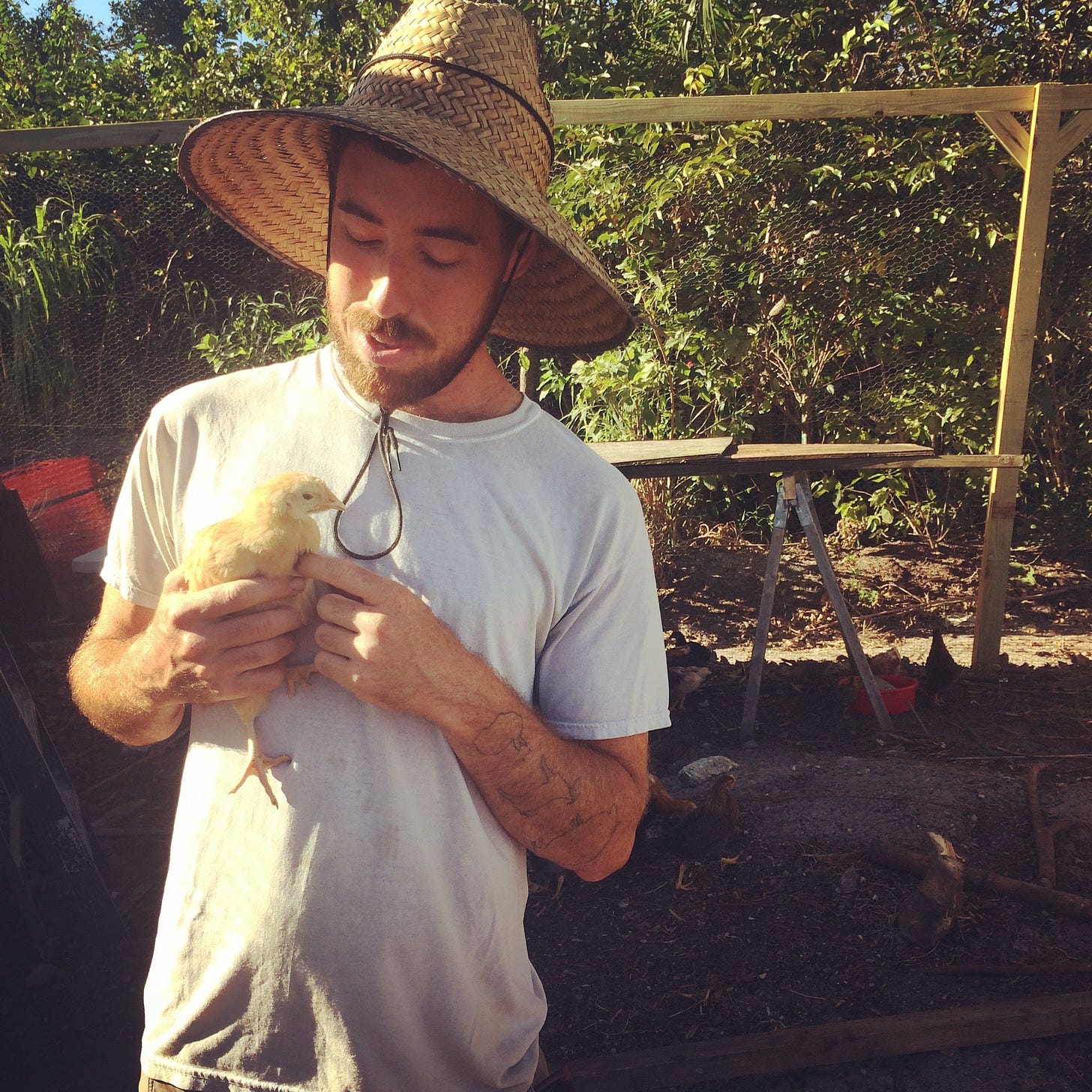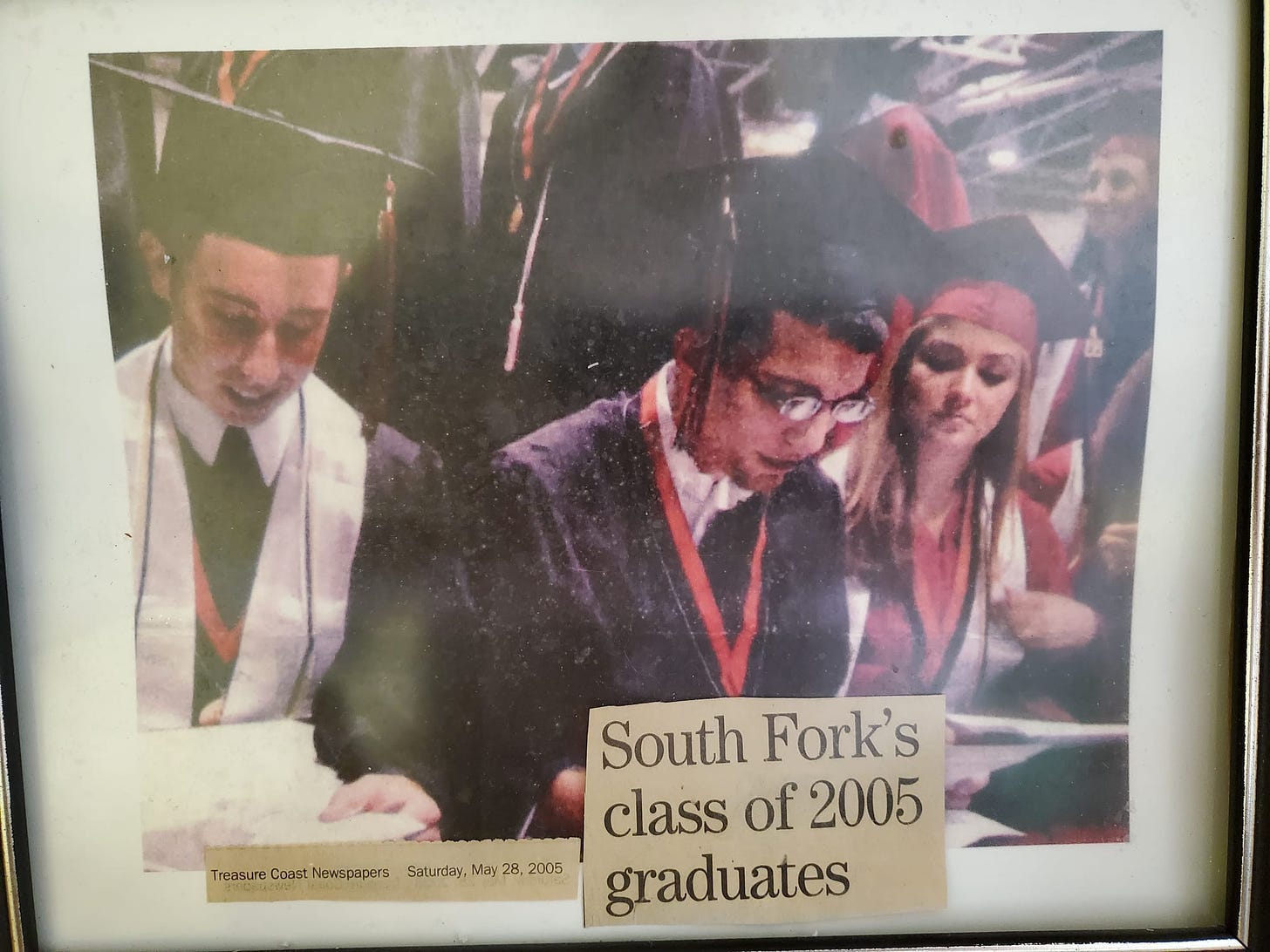Lunchtime Q+A: Mike Meier, a local urban farmer talks Florida food culture and Pride
Lunchtime Q+A #2: Mike Meier
We’re excited to bring you another Q + A with a Florida food producer! This week I asked one of my closest friends to talk with us — Mike Meier. We’ve been friends since we were 14, and co-founded Ground Floor Farm along with our fellow sister-wife Micah Hartman (Mike, Micah, Matt and I are all 2005 alums of South Fork High School!). We share a commitment to thinking about food, not just as it impacts our own bodies, but as a channel for connectivity and culture.
Mike is director of farm operations at Colab Farms, as well as a City of Stuart commissioner and recent mayor. Mike fell for food and farming while living in New York City, leaving a fancy tech marketing career to work for innovative farming operations like The Brooklyn Grange.
Mike is a driving force in our local food culture, and thinks about food and its relationship to community in an incredibly incisive way.
The following has been edited for length and clarity
1️⃣ What are the questions you wish people were asking about how their food is grown?
To be frank, most of the people who are already asking questions about how their food is grown should relax a little. How questions tend to focus on themes of purity and “clean”liness - e.g. is it organic, is it grown with pesticides, is it grown with fertilizers, is it gmo-free? These questions stem from anxiety, and they all boil down to “is it going to hurt me, make me sick, give me cancer,” etc. Yeah, that stuff is important, but I think it distracts us from the important relationship building work we need to do to eat our way towards a better community and a better climate.
I wish people asked more of the What, Where, and When questions. I wish people asked, “What’s the best stuff in season here, now? What’s at the peak of ripeness here, now? What do you have a ton of that you’re having trouble selling, and can I dry, pickle, can, or freeze it?” The more we ask these kinds of questions that stem from joy, pleasure, and solidarity, the happier and healthier we will be.
P.S. Broader How questions around farm sustainability, land access, and labor (!) are great to think and talk about, and will make us better eaters and growers.
2️⃣ How does being a queer person intersect with your identity as a farmer?
I identify as a queer person, but I want to be very clear that I am also carrying a ton of privilege. I live in a white, non-disabled, male body and I “pass” (meaning that most people wouldn’t assume I am queer based on how I present). My experiences as a farmer have been very different than for other queer folks without some or all of these privileges.
I guess I’ll take some of my own medicine and focus on the joy/pleasure/solidarity stuff... To me, there is a deep connection between queerness and small farming. Queerness to me means fluidity, openness, gentleness, resilience; it’s the opposite of being unyielding, unquestioning, rigid, adherent. It’s about experiencing, connecting, exploring, and being okay with complication, variety, and diversity. It’s also very sensual!
I feel like small farming touches on the same themes. Beautiful flowers and delicious tomatoes grow out of well-rotted shit, for example.
3️⃣ What do you love about Florida food culture? What needs fixing?
I do love that Florida food culture is a big melting pot - or maybe salad bowl? We appropriately take from Southern “Country”, Caribbean, and Central and South American foodways... lots of big, rich, pungent, spicy, and sour flavors.
Florida is the only continental U.S. state that has a tropical climate. Yet broadly we don’t seem to embody that in our own essential food culture. In Central and South Florida, we have a great climate for jicama, boniato, taro, yucca, bitter melon, plantain, etc. And farmers grow a lot of these crops here! But virtually all of it goes to specialty ethnic markets and to export. We ought to get much more comfortable with and claim these “exotic” tropical fruits, vegetables, and starches are part of our own food culture.
4️⃣ You’re a civic engagement nerd (and recent mayor of Stuart!) as well as a foodie. What role does access to delicious food play when building a great community to live?
I think food is important to community building in a couple different ways. Of course “foodieism” can play a role in creating or promoting a sense of place, helping encourage tourism, etc. But more than that, food establishments serve as important cultural and community hubs. Obviously, restaurants, cafes, and bars are more than just places to eat and drink; they’re places to hang out, catch up, have meetings, and make connections, all around the communal act of chewing and swallowing together. Those functions are really important to building community.
Local farmers markets and community gardens offer this too, and in deeper ways. Here is where we’ll share recipes, share jars of pickles, share seeds and stories.
5️⃣ Favorite thing to eat in South Florida?
Right now it’s mango lassi with honey and a squirt of calamondin.
6️⃣ How are you celebrating pride month?
I’m donating to my local PFLAG (“Parents, Families, and Friends of Lesbians and Gays") chapter and hoping you do too!
Talk to Us
Send in your comments, mailbag questions, recipe mishaps, or cooking tips: sunshineandmicrobes@gmail.com. Also do us a favor and follow us on Facebook and Instagram. Visit our website and cook yourself something nice.
If you enjoyed this email, please share it with others.
----------------------------------------------------------------------------------------
Sunshine + Microbes team
Jackie Vitale is a cook and kitchen educator based in Stuart, Fla . She runs Otto’s Bread Club and is co-founder of the Florida Ferment Fest. Her newsletter explores the intersection of food, culture, environment and community.
Matt Levin is a communications strategist at the ACLU of Texas. He edits Sunshine + Microbes and contributes other scraps to each issue.





Mike what can I grow now on Sanibel. I have Ginger that I think is ready to harvest, Yes?
I have turmeric that is sprouting. Is now the time? What should I do with my tomatoes that have stopped. Can I cut them back or keep them. Will eggplant grow on Sanibel. What about my peppers? How can I follow you?